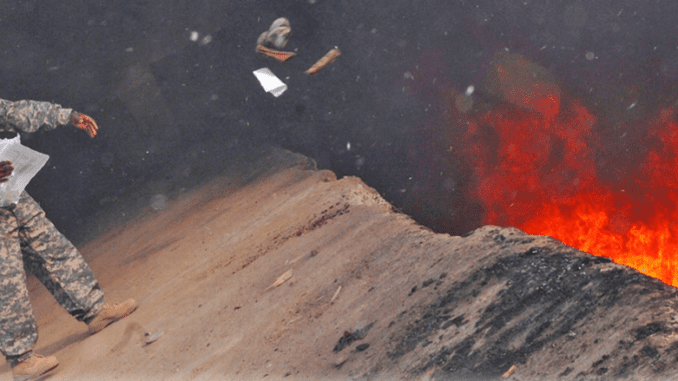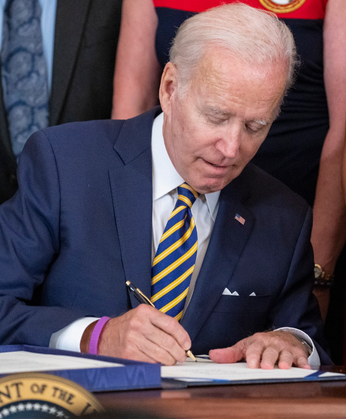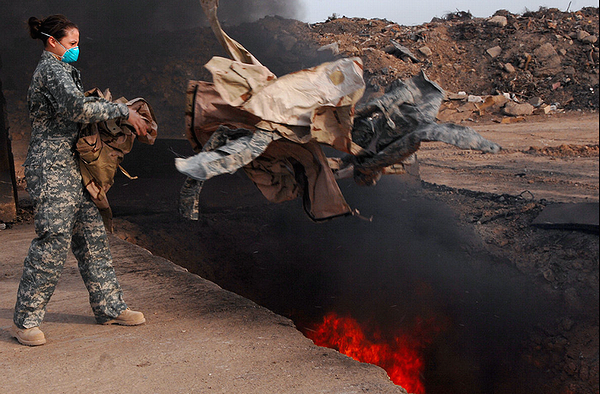
WASHINGTON, DC, August 10, 2022 (ENS) – President Joe Biden today signed the bipartisan Promise to Address Comprehensive Toxics, PACT, Act. The PACT Act is the widest expansion of benefits and services for veterans exposed to toxics in more than 30 years.
Speaking at the White House before he signed the bill into law, the President said, “You know, veterans of the wars of Iraq and Afghanistan not only faced dangers in battle, they were breathing in toxic smoke from burn pits. Because I was Vice President and the chairman of the Foreign Relations Committee before that, I was in and out of Iraq over 20 times, and in Fort Basra and all those places. You could actually see some of it in the air. Burn pits the size of football fields that incinerated wastes of war, such as tires, poisonous chemicals, jet fuel, and so much more I won’t even mention.”
“And a lot of the places where our soldiers were sleeping were literally a quarter mile, half mile away from it. And where they ate – it was there all the time. Toxic smoke, thick with poison, spreading through the air and into the lungs of our troops.”
“When they came home, many of the fittest and best warriors that we sent to war were not the same – headaches, numbness, dizziness, cancer.”

In his first State of the Union address, President Biden called on Congress to send a bill to his desk that would comprehensively address toxic exposures that have impacted veterans, as well as their families and caregivers, and provide them with the health care and benefits they have earned and deserve. Thanks to the bipartisan leaders of the House and Senate Veterans Committees, the PACT Act does that.
Republicans who had blocked the bill, which would extend benefits to an estimated 3.5 million veterans, allowed it to pass after trying unsuccessfully to limit funding for the treatments.
Not all Republicans blocked the PACT Act, though. Mike Bost of Illinois, elected to the House in 2016, supports the bill, now law.
“As a veteran myself, this goal was always a top priority of mine. The PACT Act will make a difference in the lives of millions of veterans and the survivors and families of those who have unfortunately already left us. It delivers on the promise we have made to our warfighters,” said Bost, a former Marine.
“Now, Congress will be focused on ensuring VA properly implements this massive bill. The funding in it must be strictly used for getting veterans the care, benefits, and services they are due,” Bost said.
“Sometimes military service can result in increased health risks for our veterans, and some injuries and illnesses like asthma, cancer, and others can take years to manifest. These realities can make it difficult for veterans to establish a direct connection between their service and disabilities resulting from military environmental exposures such as burn pits – a necessary step to ensure they receive the health care they earned,” President Biden said.
Everything from Uniforms to Chemicals Goes Into Burn Pits
Burn pits on U.S. military bases are areas devoted to open-air combustion of trash. The use of burn pits was a common waste disposal practice at military sites outside the United States, such as in Iraq and Afghanistan. Smoke from these pits contained substances that may have short- and long-term health effects, especially for those who were exposed for long periods or those with pre-existing asthma or other lung or heart conditions.
Waste products in burn pits include: chemicals, paint, medical and human waste, metal/aluminum cans, munitions and other unexploded ordnance, petroleum ad lubricant products, plastics and Styrofoam, rubber, wood, and discarded food. Burning waste in pits can create more hazards compared to controlled high-temperature burning – like in a commercial incinerator.

Toxins in burn pit smoke may affect the skin, eyes, respiratory and cardiovascular systems, gastrointestinal tract and internal organs.
President Biden explained that supporting those who wear the uniform is a commitment that unites all Americans – Democrats, Republicans, and Independents – and why he made supporting our veterans a core element of his agenda.
The legislation supports President Biden’s reignited Cancer Moonshot, which he first undertook as Vice President in the Obama administration in 2016, to help end cancer as we know it.
By signing the bipartisan PACT Act, President Biden says he is delivering for America’s veterans and their families, and demonstrating that we can and will come together where we agree to get big things done for our country.”
What’s in the PACT Act?
Named in honor of Sergeant First Class Heath Robinson, a decorated combat medic who died from a rare form of lung cancer, this historic legislation will help deliver more timely benefits and services to more than five million veterans across all generations who may have been impacted by toxic exposures while serving our country.
Danielle Robinson, the widow of Sergeant First Class Robinson, was a guest of the First Lady at President Biden’s first State of the Union address when he called on Congress to pass a law to make sure veterans devastated by toxic exposures, like her husband, finally get the health care and benefits they deserve.
To ensure veterans can receive high-quality health care screenings and services related to potential toxic exposures, the PACT Act expands access to Veterans’ Administration, VA, health care services for veterans exposed during their military service.
For post-9/11 combat veterans, the bill extends the period of time they have to enroll in VA health care from five to 10 years post-discharge. For those combat veterans who do not fall within that window, the bill also creates a one-year open enrollment period. These expansions mean that more veterans can enroll in VA health care without having to demonstrate a service connected disability.
The PACT Act codifies VA’s new process for evaluating and determining presumption of exposure and service connection for various chronic conditions when the evidence of a military environmental exposure and the associated health risks are strong in the aggregate but hard to prove on an individual basis.
PACT requires VA to seek independent evaluation of this process as well as external input on the conditions it will review using this framework. The new process is evidence-based, transparent, and allows VA to make faster policy decisions on crucial exposure issues.
This new process has already fundamentally changed how VA makes decisions on environmental exposures and ensures more veterans have access to the care they need.
The legislation removes the need for certain veterans and their survivors to prove service connection if they are diagnosed with one of 23 specific conditions, reducing the amount of paperwork and need for exams that veterans diagnosed with one of these conditions must complete before being granted access to health care and disability compensation, speeding up their receipt of the benefits they have earned. This list includes 11 respiratory related conditions, along with several forms of cancer, including reproductive cancers, melanoma, pancreatic cancer, kidney cancer, and brain cancers such as glioblastoma. Survivors of veterans who died due to one of these conditions may now also be eligible for benefits.
To better understand the impact of toxic exposures, the PACT Act requires VA to conduct new studies of veterans who served in Southwest Asia during the Gulf War and analyses of post-9/11 veterans’ health trends. The new law also directs the Secretary of Veterans Affairs to convene a new interagency working group to develop a five-year strategic plan on toxic exposure research.
Ensuring veterans get the care they need includes ensuring that they are screened for toxic exposure and that VA personnel have the appropriate education and training. The PACT Act requires that veterans enrolled in VA health care be screened regularly for toxic exposure related concerns. This new law also requires VA to establish an outreach program for veterans regarding toxic exposure related benefits and supports, and to require additional toxic exposure related education and training for VA personnel.
This bill also delivers critical resources to VA to ensure it can deliver timely access to services and benefits for all veterans eligible, including those already enrolled. The PACT Act provides VA with mechanisms to enhance claims processing and to increase the workforce.
The bill also invests in VA health care facilities by authorizing 31 major medical health clinics and research facilities in 19 states.
VA plans to hire health professionals, including physicians, nurse practitioners, and physician assistants who will specialize in conducting patient assessments regarding the health effects of military exposures.
By January 2023, VA expects to have a fully operational call center and network of experts to help veterans concerned about environmental exposure and provide consultative services to veterans in primary care clinics.
Biden-Harris Administration Record of Action on Military Toxic Exposures
This historic legislation builds on the Biden-Harris Administration’s existing efforts to address the harmful effects of environmental exposures affecting service men and women:
Established Presumption for Rare Respiratory Cancers: In April 2022, VA defined presumptive service connection for several rare respiratory cancers for certain veterans – a step that marked progress toward President Biden’s commitment to end cancer as we know it. Since this change, VA has been able to complete more claims for veterans and survivors involving a possible presumption of rare respiratory cancer. With VA taking steps to raise awareness of these benefits, we expect the number of claims to rise in the months ahead.
Processing Claims for New Presumptive Respiratory Conditions: In August 2021, VA began processing disability claims for asthma, rhinitis, and sinusitis based on presumed exposure to particulate matter. Veterans who served in the Southwest Asia theater of operations and other areas and who developed these conditions within ten years of military service are now eligible to apply for disability benefits and access to VA health care. Since August, VA has completed 33,276 claims, granting over 25,000 veterans and their survivors benefits for one or more conditions, leading to over $93 million in retroactive benefit payments.
Raising Awareness of VA Benefits Related to Military Exposures: Many veterans remain unaware of their eligibility for benefits and services related to potential military exposures. Beginning in November 2021, VA launched a proactive campaign to inform and encourage veterans to file claims related to military environmental exposures.
Requiring Training for VA and Non-VA Providers: Health care providers and compensation and pension examiners sometimes do not have the training to understand or treat veterans’ exposure concerns. To address this challenge, VA directed compensation and pension providers and Veterans Health Administration clinicians to complete a training module on assessing deployment related to environmental exposures. VA is also encouraging all providers who care for veterans outside of VA through the Community Care Network contract to complete training on the TRAIN Learning Network, VA’s publicly available training site. Furthermore, VA employees and community care providers have been directed to utilize the Exposure Ed App to help providers provide information to veterans on health effects associated with certain exposures during military service. More information on the app is available here.
Implementing a Network of Specialized Providers and Call Center: Veterans with concerns about the health outcomes of military exposures experience inconsistent care to address these specific issues, especially outside of VA. Earlier this year, VA launched VET-HOME, The Veterans Exposure Team-Health Outcomes of Military Exposures.
Featured image: U.S. veterans were exposed to respiratory hazards from burn pits during deployments to Iraq and Afghanistan. (Photo courtesy U.S. Veterans Administration)



